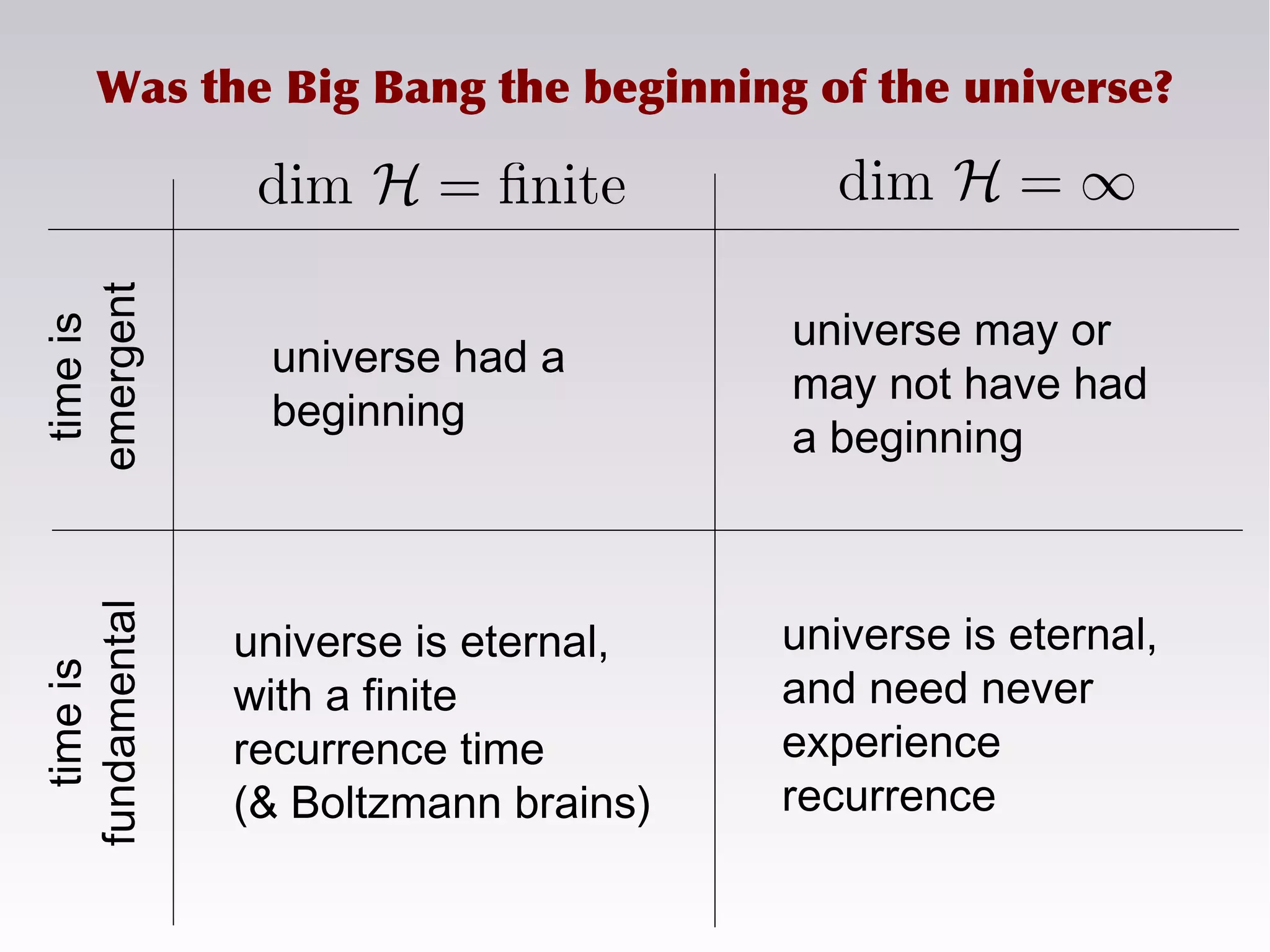The document discusses various theories and viewpoints on the origins of the universe, focusing on the Big Bang, spacetime theories, and quantum mechanics. It emphasizes the low entropy of the early universe, potential alternate cosmological models such as bouncing and reproducing universes, and the implications for the nature of time. Ultimately, it raises questions about whether the universe had a definitive beginning or if it is eternal in nature.
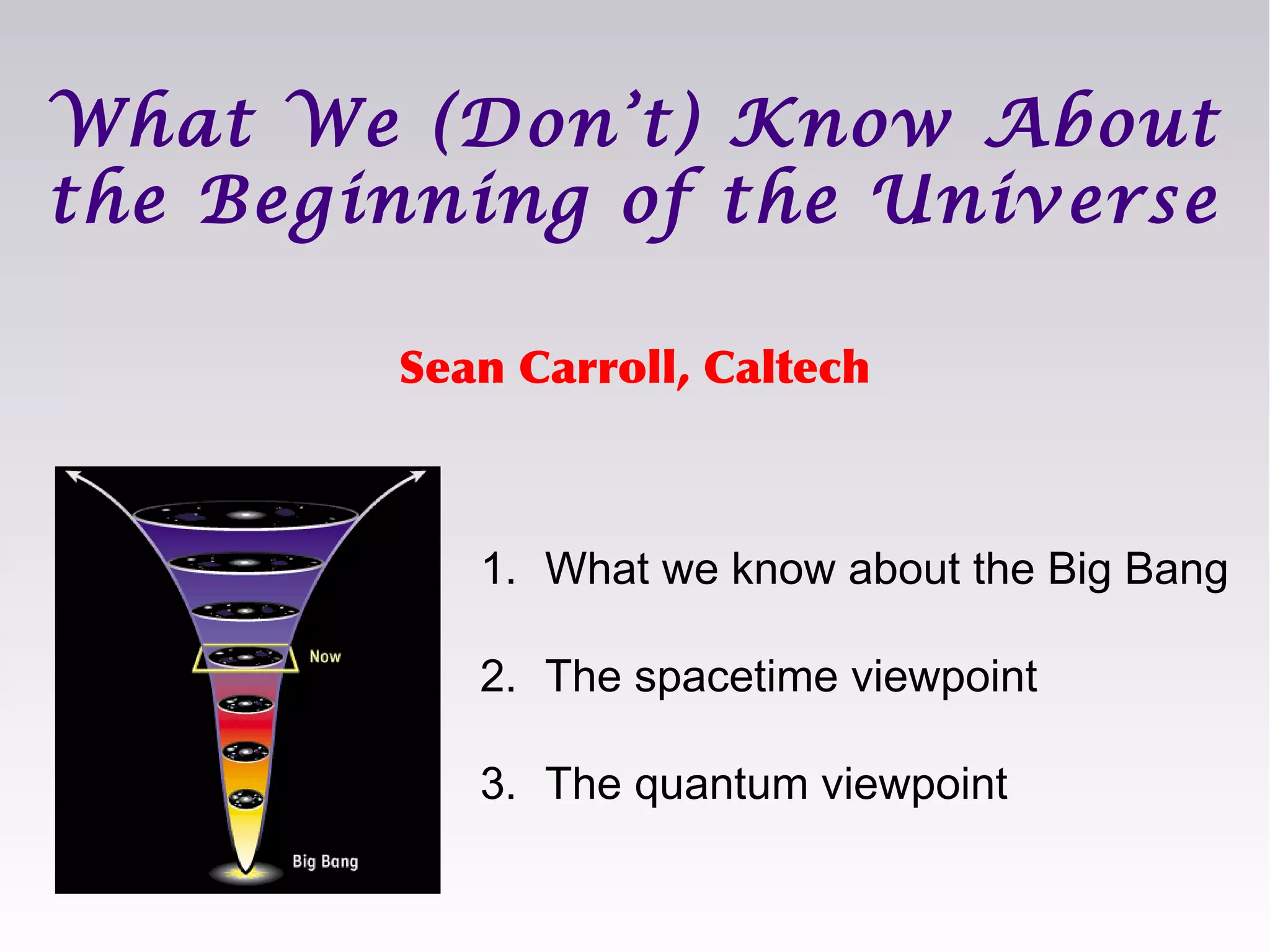
![What we know about the Big Bang:
1. Something Bang-like happened.
standard GR
(ΛCDM)
today
allowed
histories
[Carroll & Kaplinghat][Planck]
cosmic background radiation primordial nucleosynthesis
The universe 13.8 billion years ago was hot, dense,
expanding very rapidly, and decelerating.](https://image.slidesharecdn.com/aas-big-bang-carroll-170124163023/75/What-We-Don-t-Know-About-the-Beginning-of-the-Universe-2-2048.jpg)
![What we know about the Big Bang:
2. Classical GR suggests singularities are generic.
Highly symmetric universes tend
to have an initial singularity (Lemaître).
More strongly, Hawking’s theorem:
compact expanding universes obeying
the Strong Energy Condition (gravity
attracts) always have singularities.
[Donald Menzel, Popular Science, 1932]
But the Strong Energy
Condition can be violated.
And theorists are happy to
consider modifying GR.](https://image.slidesharecdn.com/aas-big-bang-carroll-170124163023/75/What-We-Don-t-Know-About-the-Beginning-of-the-Universe-3-2048.jpg)
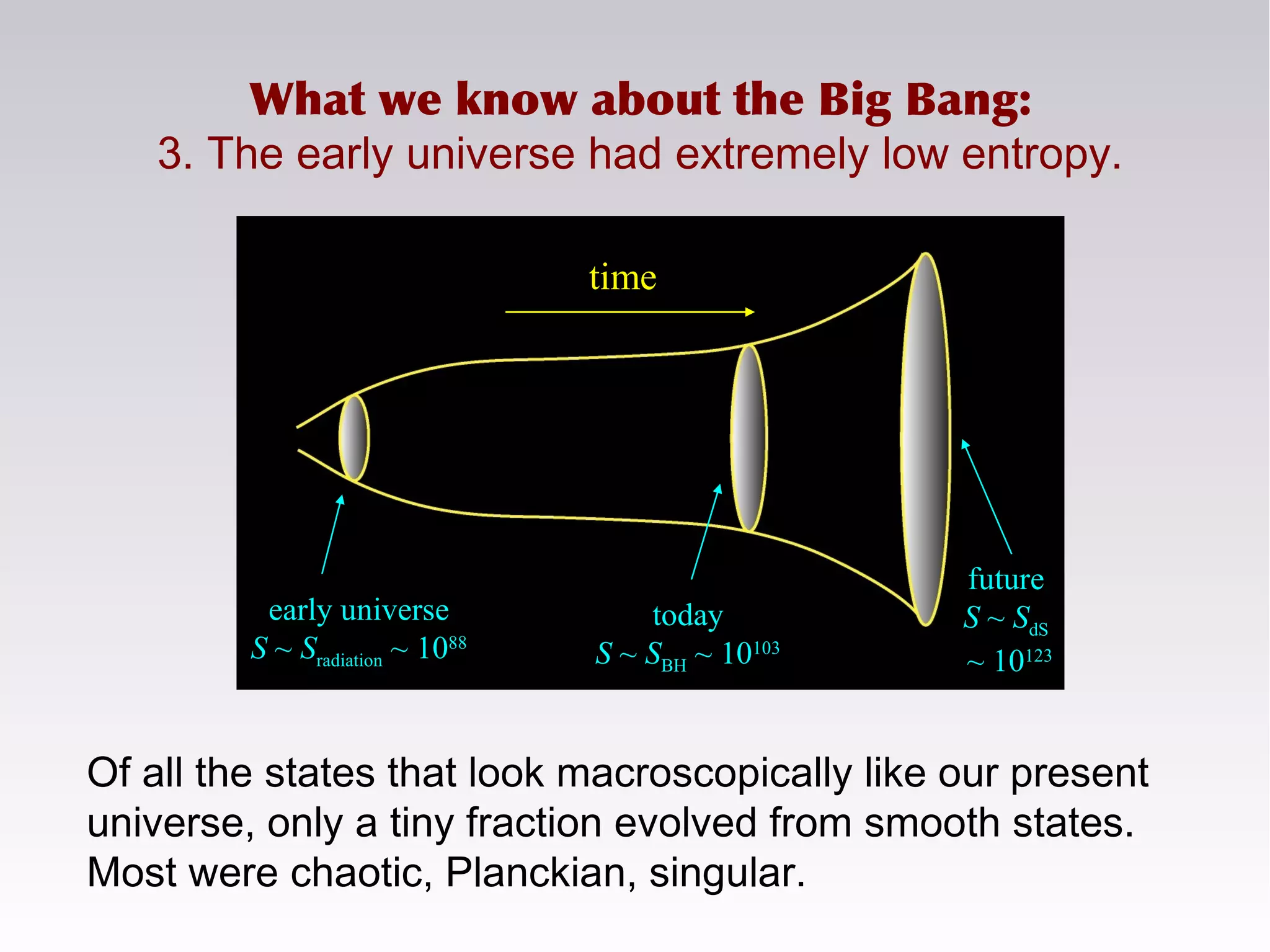
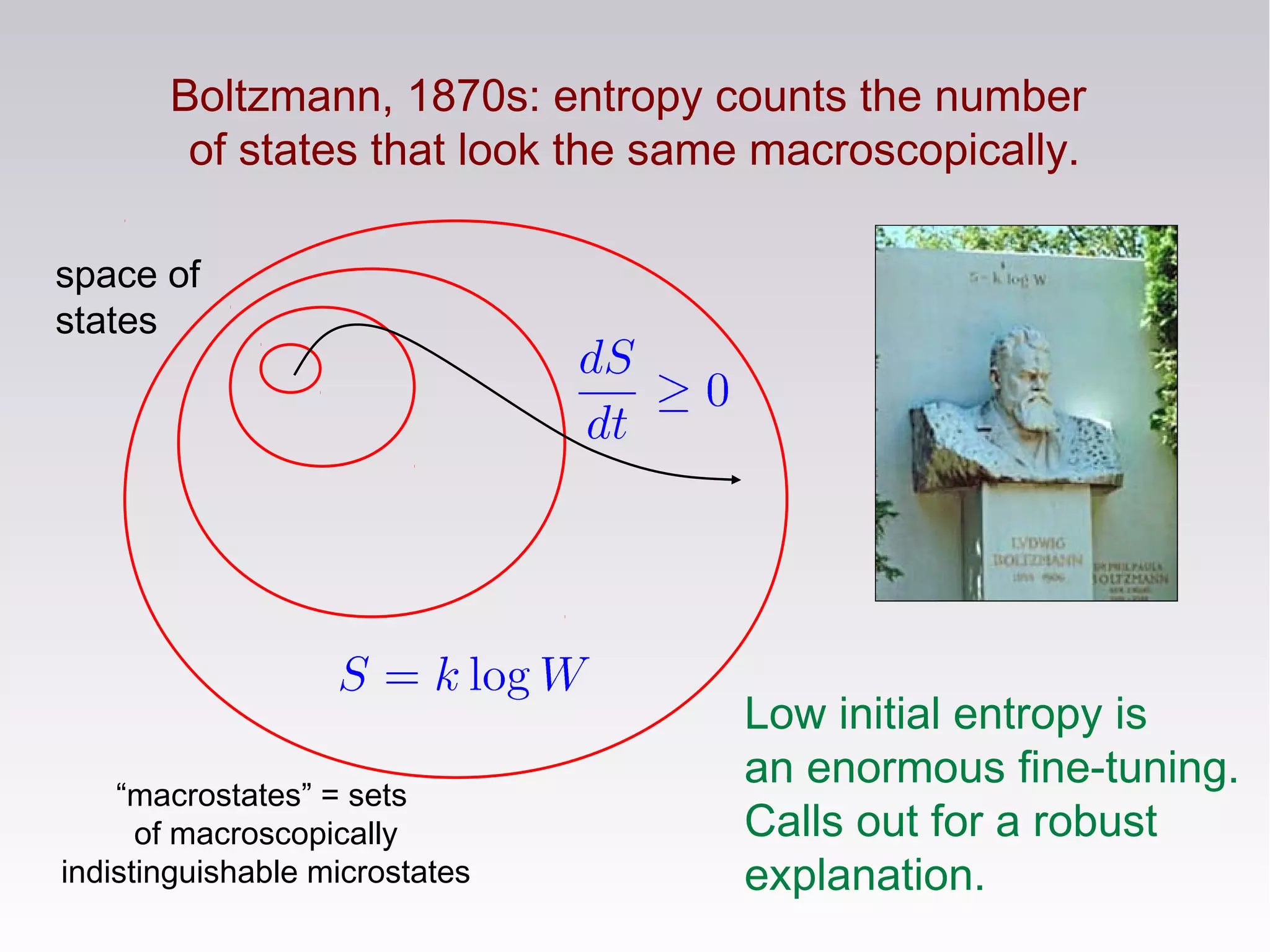
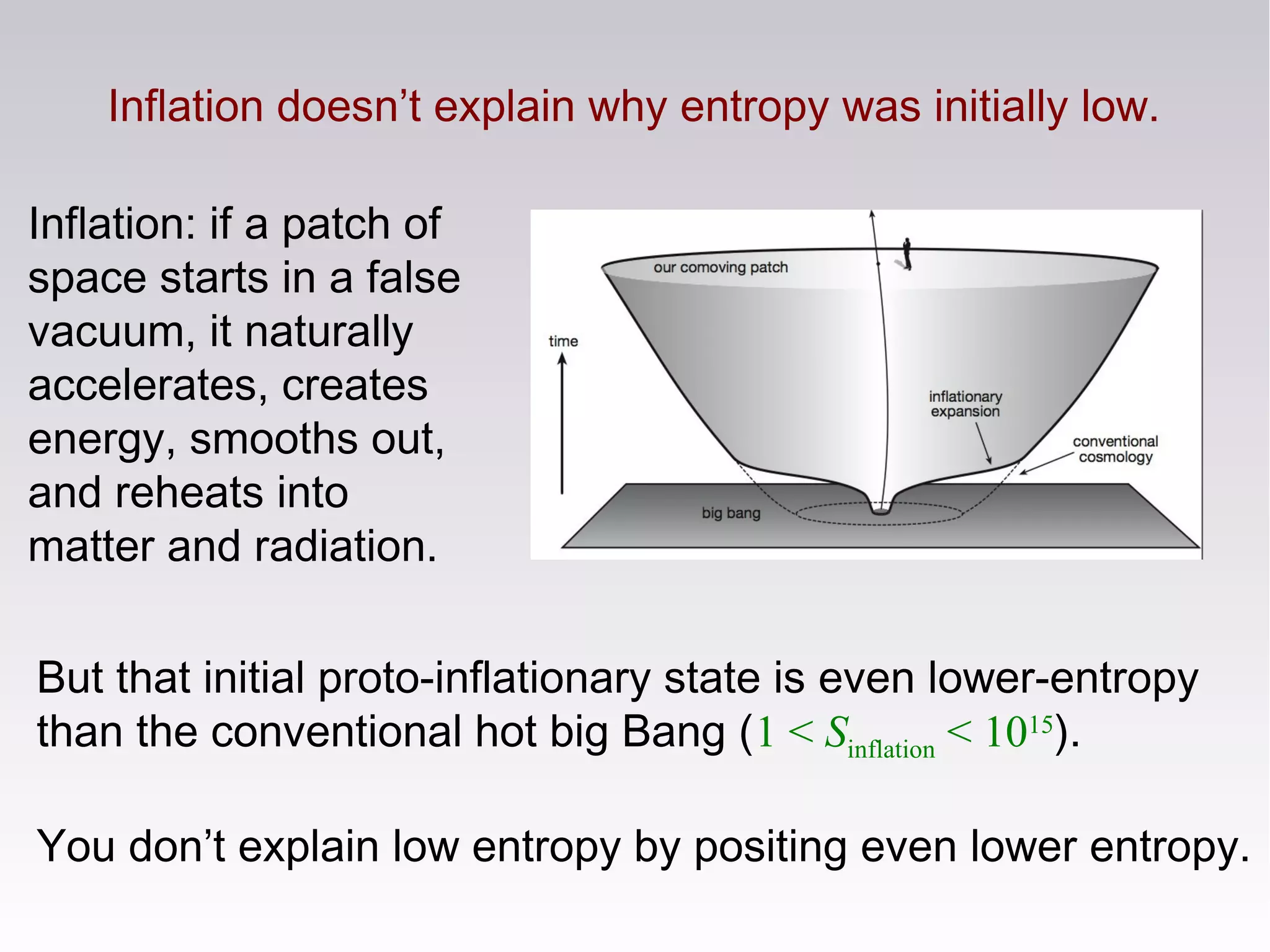
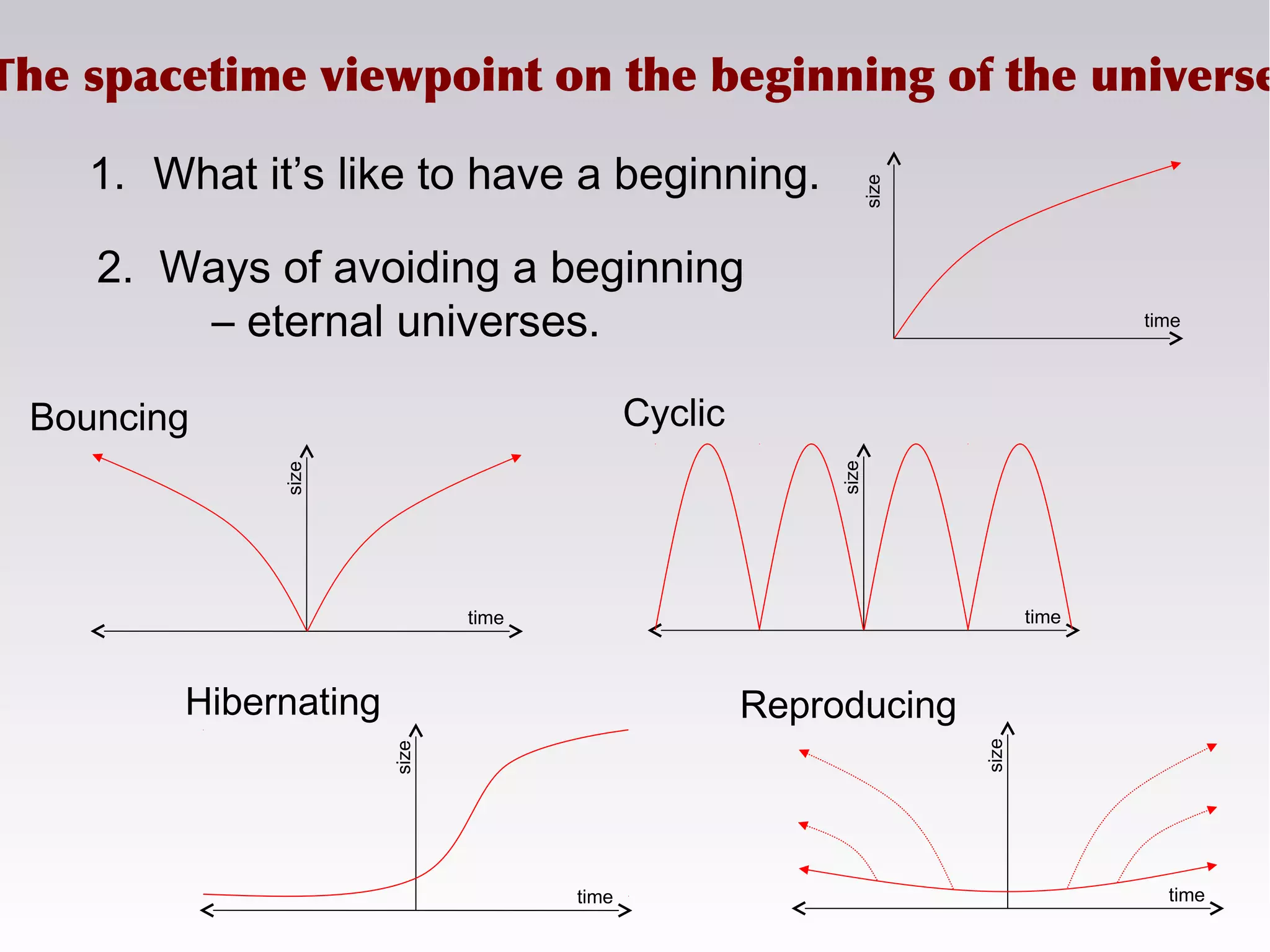
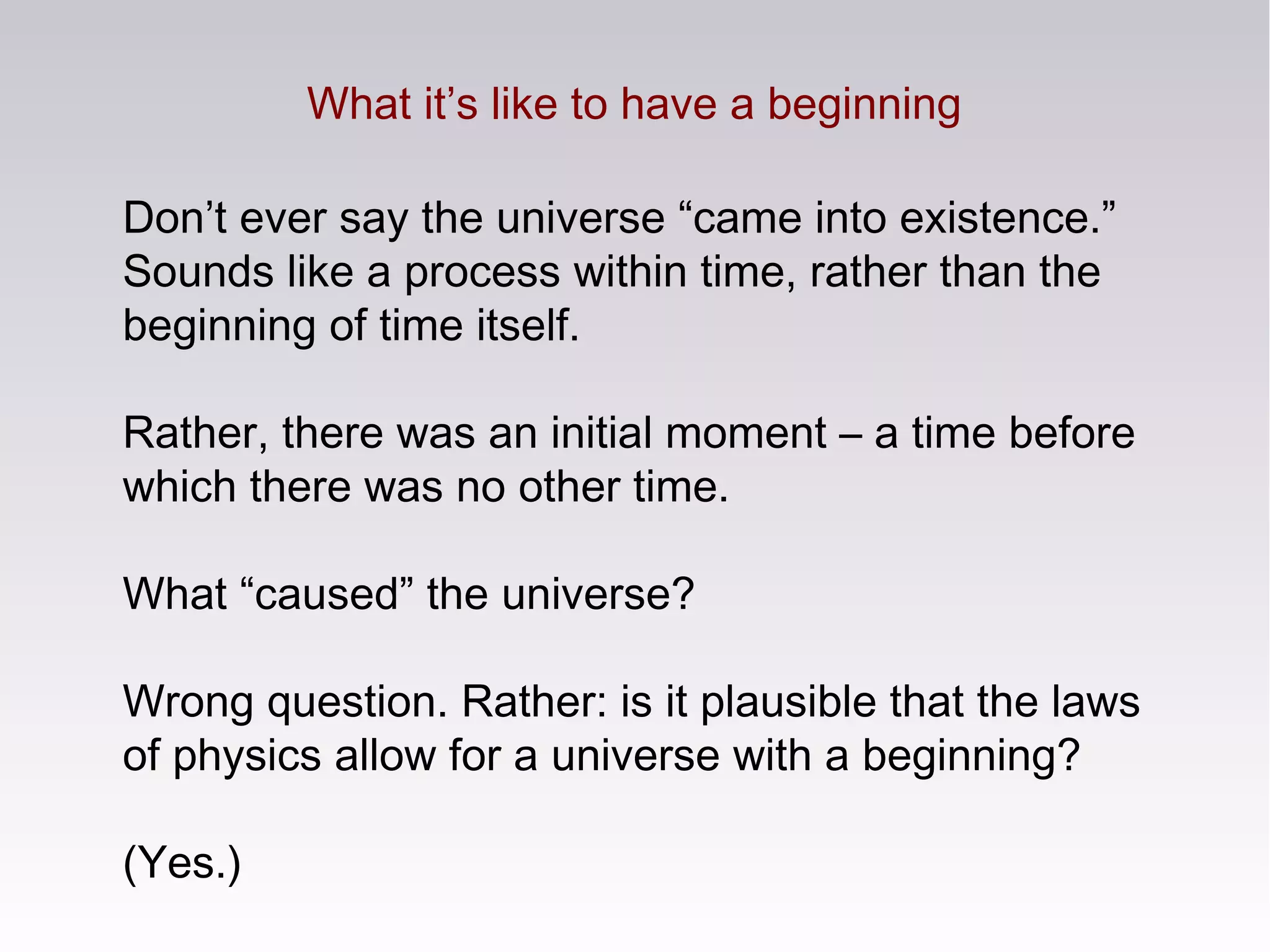
![Bouncing cosmologies
Smooth out the singularity, either through new degrees
of freedom (fields, branes, dimensions), or through
intrinsically quantum effects.
Stringy Bounce
[Veneziano]
Quantum
Cosmology
[Bojowald, Ashtekar,
Page, Hartle,
Hawking, Hertog]
de Sitter Bounce
[Aguirre, Gratton]
Ekyprotic Bounce
[Khoury, Ovrut,
Steinhardt, Turok]](https://image.slidesharecdn.com/aas-big-bang-carroll-170124163023/75/What-We-Don-t-Know-About-the-Beginning-of-the-Universe-9-2048.jpg)
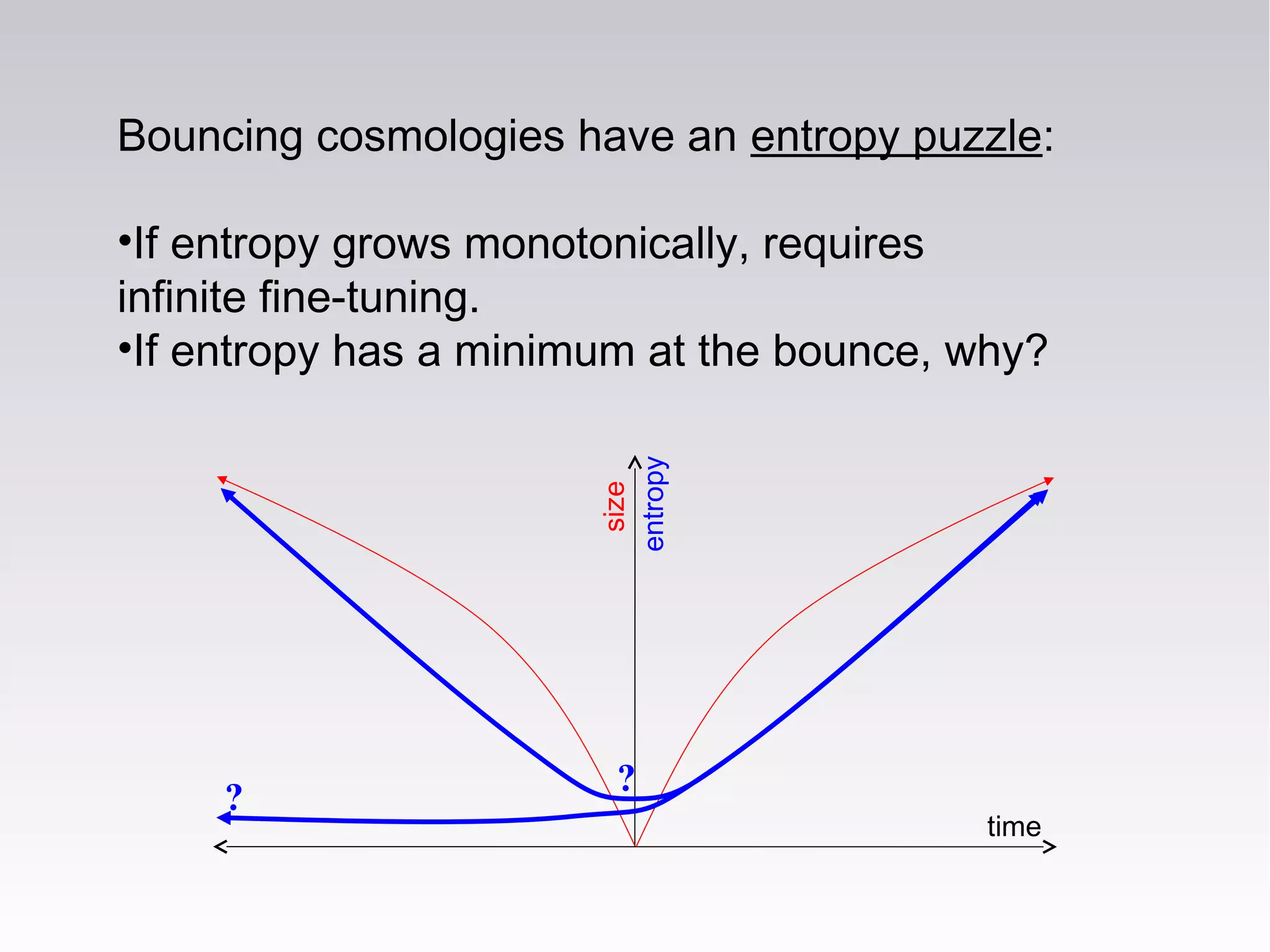
![Cyclic cosmologies
Repeat the bounce over and over.
[Turok, Steinhardt; Penrose]](https://image.slidesharecdn.com/aas-big-bang-carroll-170124163023/75/What-We-Don-t-Know-About-the-Beginning-of-the-Universe-11-2048.jpg)
![Hibernating cosmologies
Universe is quiescent and quasi-stationary into
the eternal past; at some point undergoes a phase
transition and begins to expand.
[Brandenberger, Vafa] [Greene, Hinterbichler, Judes, Parikh]
String gas cosmology Primordial degravitation](https://image.slidesharecdn.com/aas-big-bang-carroll-170124163023/75/What-We-Don-t-Know-About-the-Beginning-of-the-Universe-12-2048.jpg)
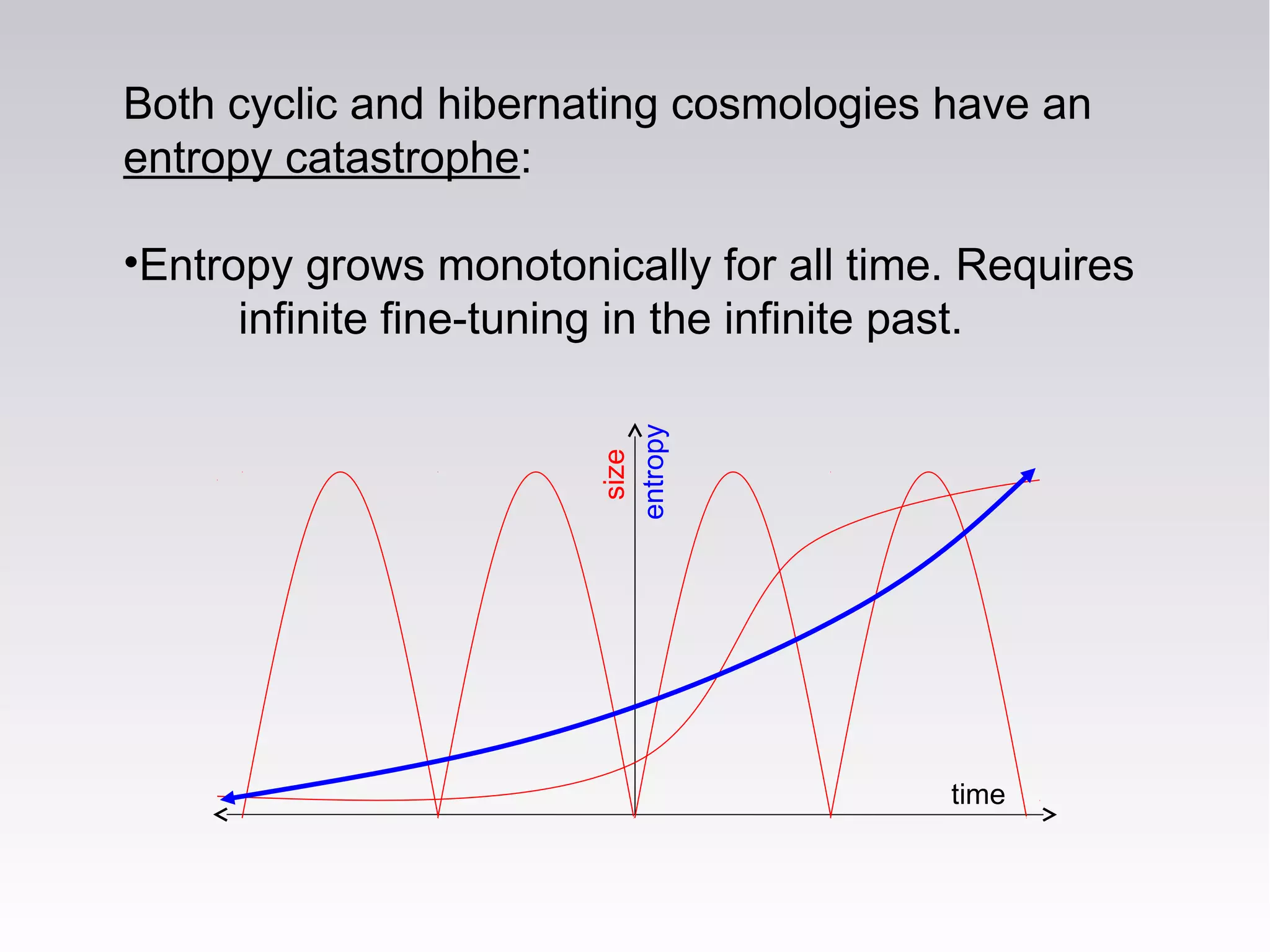
![[Farhi, Guth, Guven]
Reproducing cosmologies
Imagine a “parent” universe that
is itself quiescent and high-entropy.
But through some mechanism it can give birth to new
offspring universes, with initially low entropy.
E.g. spacetime quantum tunneling into disconnected
“baby universes.”
size
time](https://image.slidesharecdn.com/aas-big-bang-carroll-170124163023/75/What-We-Don-t-Know-About-the-Beginning-of-the-Universe-14-2048.jpg)
![2 large
dimensions
Alternatively: spontaneous compactification
1 large dimension,
1 compact
2 large
dimensions
1 large dimension,
1 compact
Six-dimensional de Sitter space w/electromagnetic fields
will spontaneously nucleate four-dim de Sitter universes.
[Carroll,
Johnson,
& Randall]](https://image.slidesharecdn.com/aas-big-bang-carroll-170124163023/75/What-We-Don-t-Know-About-the-Beginning-of-the-Universe-15-2048.jpg)
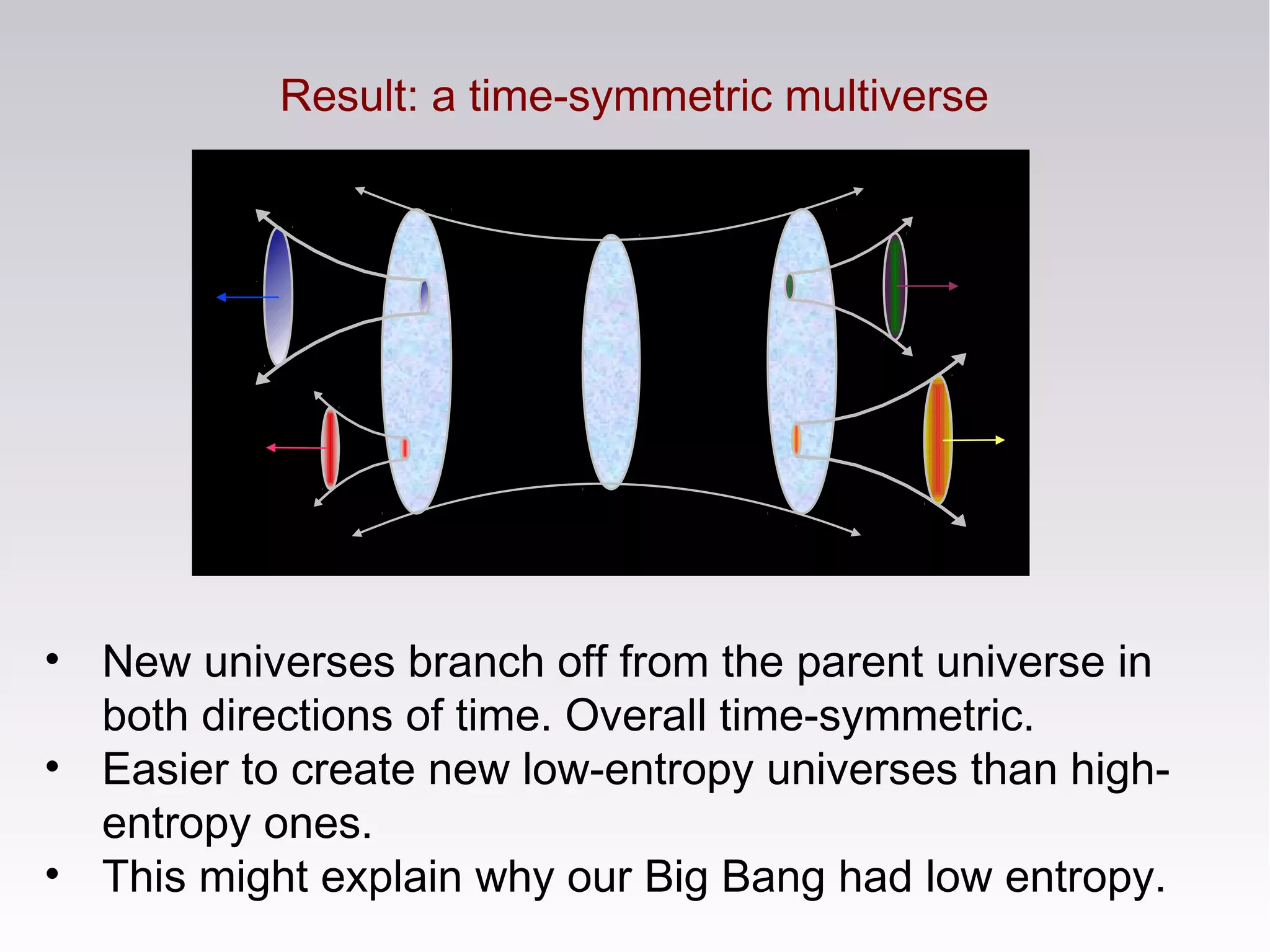
![Reproducing cosmologies don’t have an entropy problem!
•Entropy grows without bound toward past and future.
•There is a middle point of lowest entropy, but it
needn’t be “low” in any objective sense. (Indeed,
it can be locally maximal.)
size
time
entropy
[Carroll & Chen; see also Barbour, Koslowski & Mercati;
Hartle & Hertog; Goldstein, Tomulka & Zanghi; Carroll & Guth]](https://image.slidesharecdn.com/aas-big-bang-carroll-170124163023/75/What-We-Don-t-Know-About-the-Beginning-of-the-Universe-17-2048.jpg)
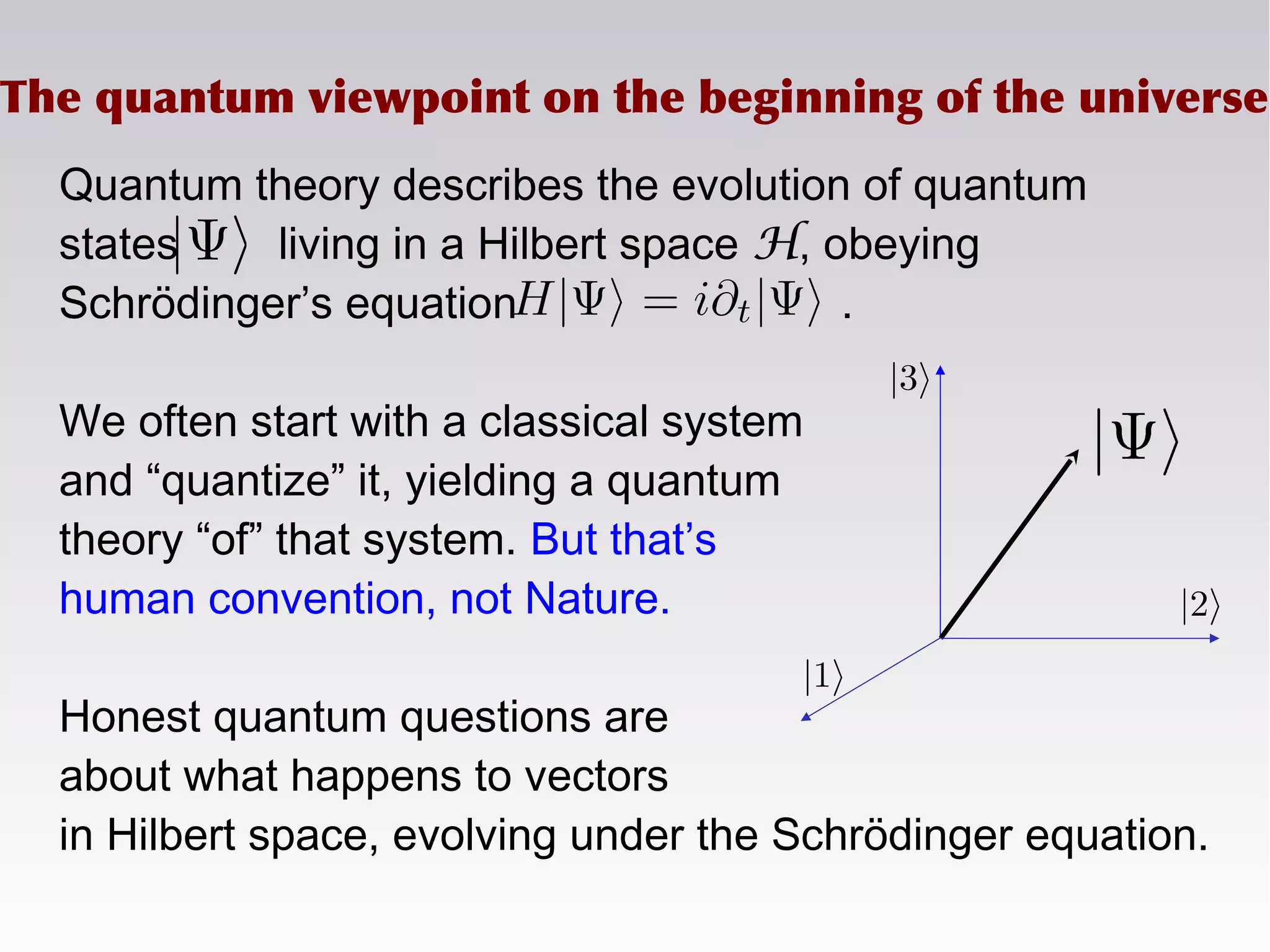
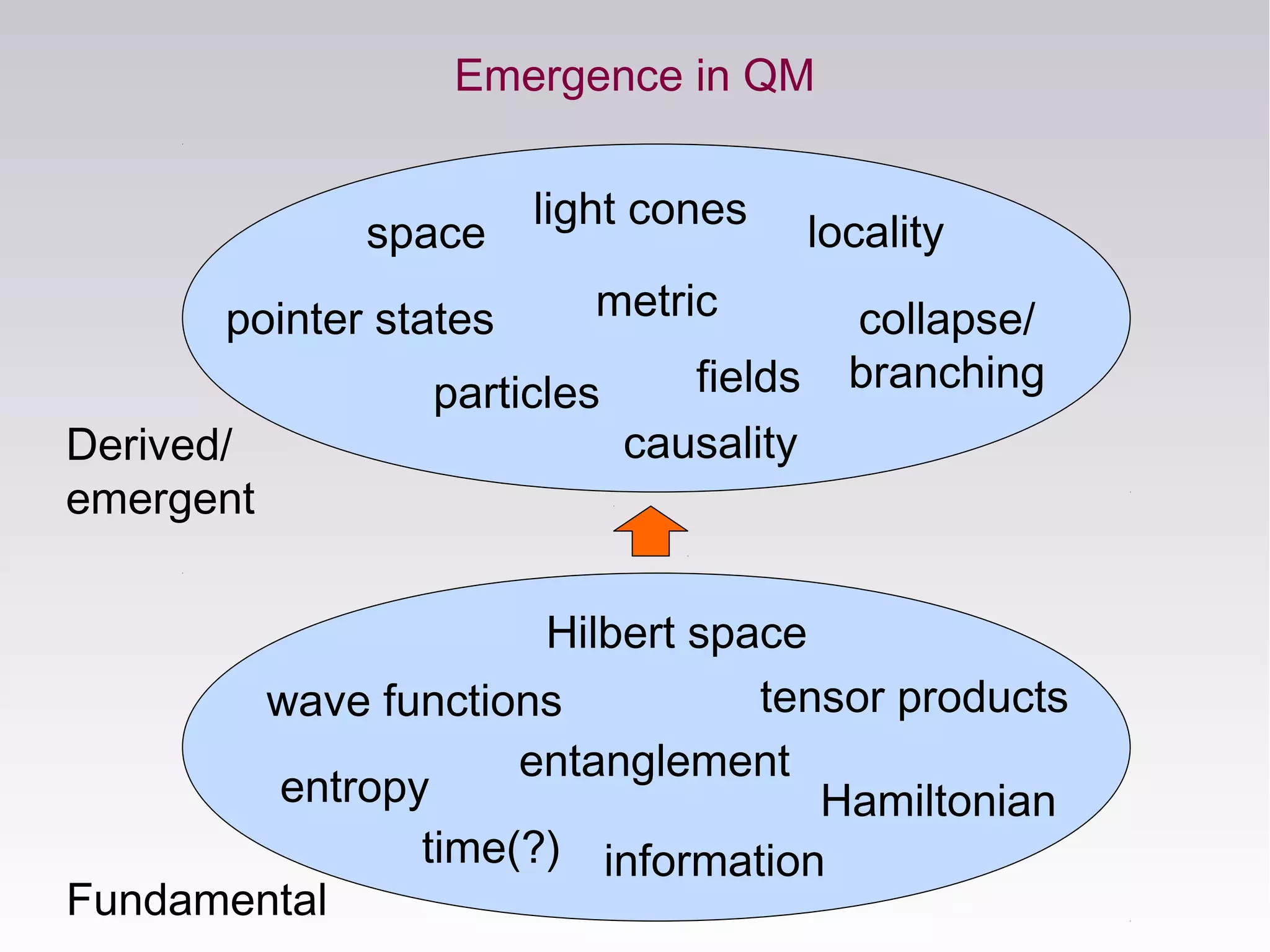
![Time evolution: the Quantum Eternity Theorem
• Consider a universe described by a quantum state
obeying Schrödinger’s equation
with nonzero energy, governed by laws of
physics that are independent of time.
• Then: the universe is eternal.
(Time t runs from –∞ to +∞.)
[Carroll, 2008, arxiv:0811.3722]](https://image.slidesharecdn.com/aas-big-bang-carroll-170124163023/75/What-We-Don-t-Know-About-the-Beginning-of-the-Universe-20-2048.jpg)
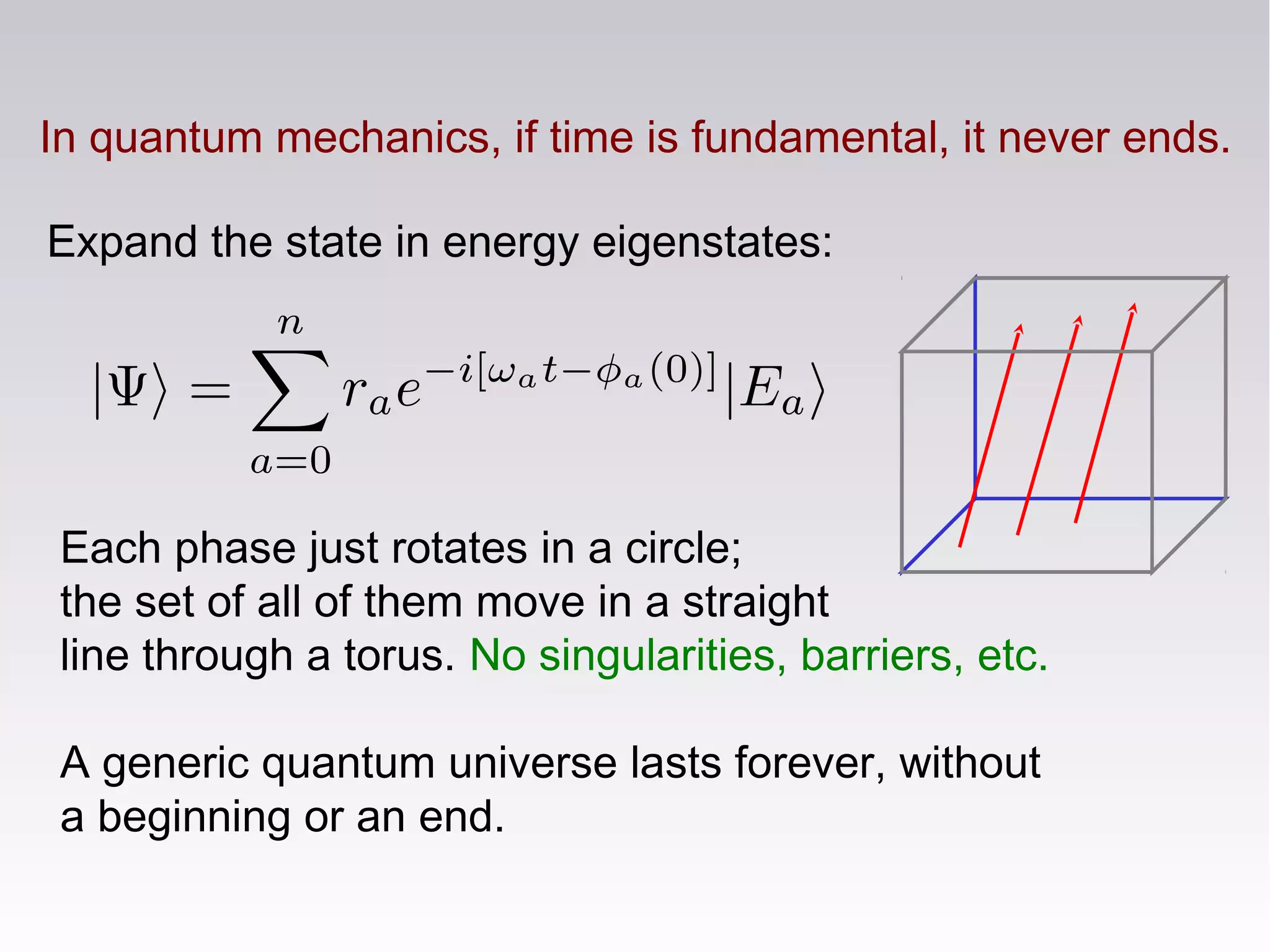
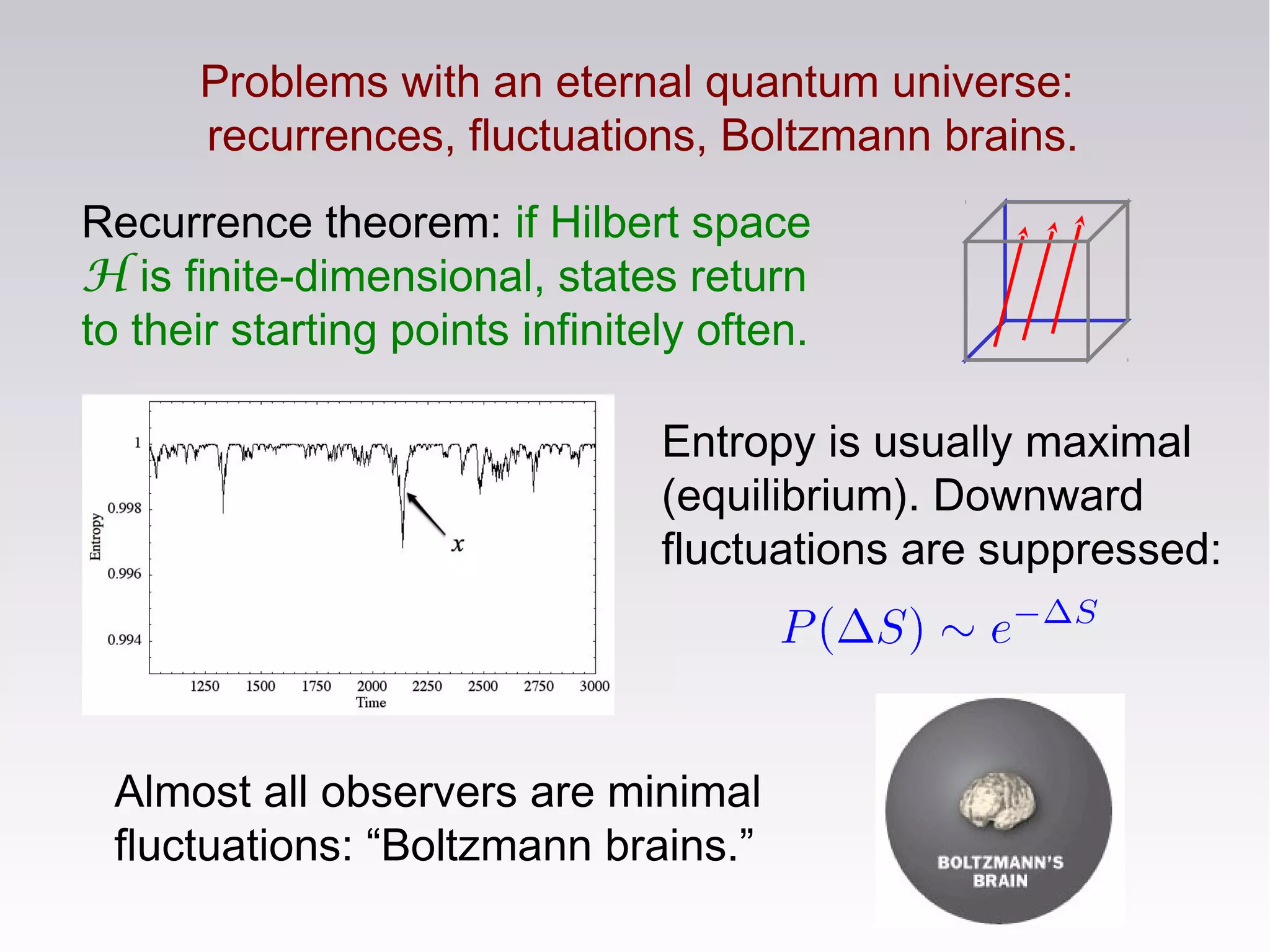
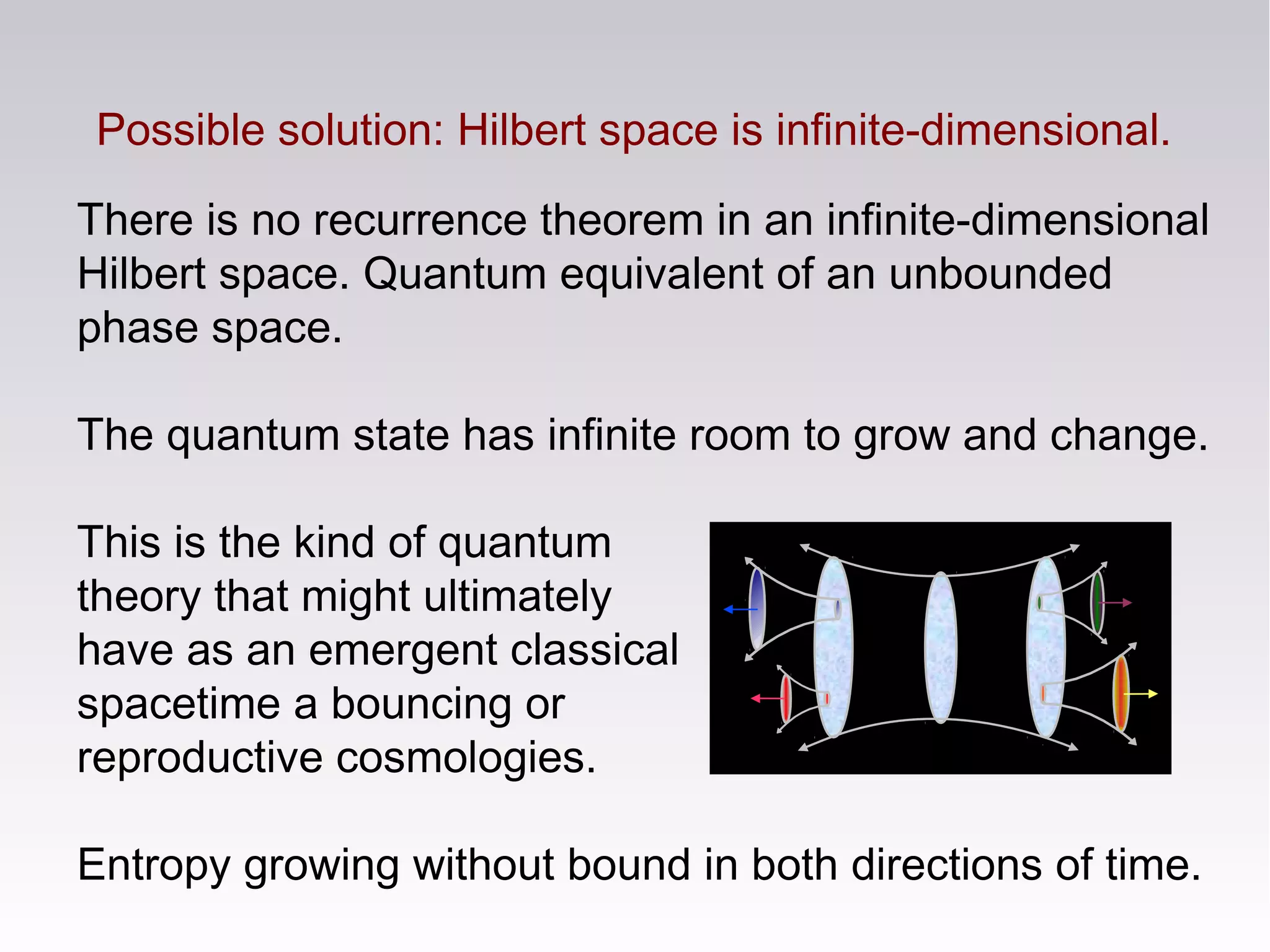
![Alternative: time is emergent, not fundamental
Loophole for Quantum Eternity Theorem: we live
in a single energy eigenstate. E.g. .
Seems non-generic, but is exactly what we get by
quantizing general relativity: the Wheeler-DeWitt
equation for a wave function of spatial three-metrics.
Where does time come from?
[e.g. Hartle, Hawking]](https://image.slidesharecdn.com/aas-big-bang-carroll-170124163023/75/What-We-Don-t-Know-About-the-Beginning-of-the-Universe-24-2048.jpg)
![Time can emerge in quantum mechanics
because we can superpose different states
[Page & Wootters 1983]
Emergent time: a stationary
state is a superposition;
one subsystem serves as
an effective “clock.”
t = 1
t = 2
t = 3
Ordinarily: quantum state
evolves as time passes.](https://image.slidesharecdn.com/aas-big-bang-carroll-170124163023/75/What-We-Don-t-Know-About-the-Beginning-of-the-Universe-25-2048.jpg)
![If Hilbert space is infinite-dimensional, emergent “time”
can run forever. No need for a beginning – but there could
be one.
But if Hilbert space is finite-dimensional, there are only a
finite number of possible clock states.
Therefore, time will have a beginning.
Ψ [hij, ψa
] internal “clock” λ(hij, ψa
)
semiclassical
trajectory
superspace = {3-geometries, matter fields}](https://image.slidesharecdn.com/aas-big-bang-carroll-170124163023/75/What-We-Don-t-Know-About-the-Beginning-of-the-Universe-26-2048.jpg)
